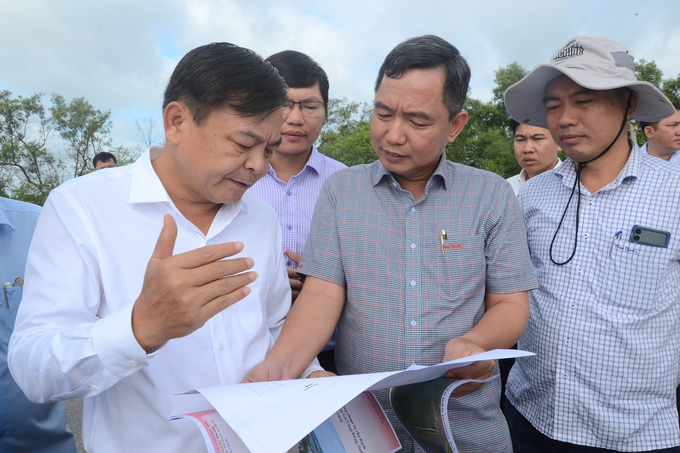June 16, 2025 | 11:14 GMT +7
June 16, 2025 | 11:14 GMT +7
Hotline: 0913.378.918
June 16, 2025 | 11:14 GMT +7
Hotline: 0913.378.918
The Southern Institute of Water Resources Research is a regional division of the Vietnam Institute of Water Resources Research, entrusted with the mission of conducting scientific research to serve the public utilities of the state. This includes participation in postgraduate education, international cooperation, consultation, and technology transfer in the fields of hydraulic engineering, hydropower, and the environment.

Deputy Minister of the Ministry of Agriculture and Rural Development, Mr. Nguyen Hoang Hiep, exchanging views with the Director of the Southern Institute of Water Resources Research, Mr. Tran Ba Hoang, during an inspection of landslides in Tien Giang. Photo: Nguyen Thuy.
To commemorate the 45th anniversary of the establishment of the Southern Institute of Water Resources Research (August 19, 1978 - August 19, 2023), on August 18, the institute organized a seminar on "Science and Technology in Hydraulic Engineering for Sustainable Development" with the participation of scientists, experts, and local representatives.
According to Dr. Tran Ba Hoang, the Director of the Southern Institute of Water Resources Research (hereinafter referred to as the Institute), this event provides an opportunity to reflect on the 45-year journey of building and developing the Institute in scientific research and technology. The Institute has made significant contributions to the Government, Ministry, sector, and has resolved numerous challenging issues related to hydraulic engineering in the Southern region.
In the current context, the Southern region, Central South, as well as the Central Highlands are facing both significant opportunities and challenges, particularly those arising from climate change, rising sea levels, droughts, saline intrusion, water quality deterioration, land subsidence, riverbank erosion, and coastal erosion.
Simultaneously, internal development processes and upper-level impacts have altered the flow patterns towards the Mekong Delta region over the past period. This is evidence of the dynamic challenges regarding water resources and the environment. These issues present significant but solvable problems for the field of Hydraulic Engineering, aiming to contribute to the sustainable socio-economic development of the Southern provinces. This is also one of the central tasks outlined in Government Resolution 120 for the Mekong Delta region in the current phase.
During this scientific seminar, the Southern Institute of Water Resources Research presented some outstanding scientific and technological results, such as techniques for constructing riverbank and coastal protection works; application of new scientific and technological advancements in designing, constructing, managing, and operating water control structures in tidal areas of the Mekong Delta and Ho Chi Minh City; utilization of information technology in the operation of hydraulic structures and water quality monitoring.
"These are areas where the Southern Institute of Water Resources Research has accumulated substantial research experience throughout its construction and development process," Dr. Tran Ba Hoang said.
At the seminar, experts, scientists, and local representatives engaged in discussions on scientific topics within the field of hydraulic engineering, as well as current challenges in practice in the Mekong Delta provinces.
Through these interactions, participants conveyed their hopes for the Southern Institute of Water Resources Research to continue proposing scientific projects that address the strategic issues of the country and the sector. They also encouraged in-depth research, successful knowledge transfer, and the practical application of scientific and technological results.
Prominent achievements in scientific and technological activities
The Southern Institute of Water Resources Research has been consistently engaged in specialized forecasting activities related to saline intrusion and water resources in the hydraulic systems of the Mekong Delta region. It has also identified the potential for water extraction to support production and daily life during the dry season.
On a daily and weekly basis, the Institute provides rapid reports to the Ministry of Agriculture and Rural Development and local authorities in the Mekong Delta region. Simultaneously, it furnishes data to media agencies to disseminate information for production purposes and to mitigate damages caused by saline intrusion.
In the realm of scientific research and technology transfer, the Southern Institute of Water Resources Research has achieved noteworthy results in aquaculture, water resources, and the environment. These results encompass riverbank and coastal rehabilitation, disaster prevention and mitigation, hydraulic structure construction, as well as the study and application of new materials and technologies in hydraulic engineering. The Institute has also explored the utilization of mathematical models, remote sensing technologies, and geographic information systems (GIS).
Translated by Nguyen Hai Long

(VAN) The UNESCO Global Geopark revalidation of Non nuoc Cao Bang and the transition to a two-tier administrative model are presently undergoing a pivotal moment in Cao Bang, the northernmost province of Vietnam.
/2025/06/13/5330-2-004539_953.jpg)
(VAN) Changing policy mindset and removing investment barriers are urgent requirements to open up new development space for enterprises in the agricultural sector.

(VAN) The areas include the restoration of five million hectares of marine ecosystems.

(VAN) Dr. Le Van Nguyen, Director of the Institute of E-Commerce Management (ECM), emphasizes the potential for green development through the cultivation of fruit trees, particularly in provinces such as Son La.

(VAN) VAAS and numerous Vietnamese enterprises have signed cooperation agreements with Japanese partners to promote agricultural technology and trade connectivity.
/2025/05/29/5625-12-214801_567.jpg)
(VAN) Provincial mergers in the Mekong Delta promise to streamline administration, expand inter-provincial raw material areas, and foster close linkages in agricultural value chains, benefiting both businesses and cooperatives.

(VAN) Merging Mekong Delta provinces contributes to the expansion of agricultural raw material areas, addressing previous constraints caused by provincial boundaries. Additionally, this expansion will reduce costs and strengthen linkages between businesses, cooperatives, and farmers.